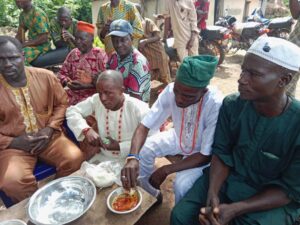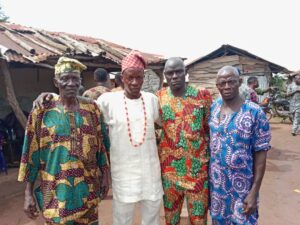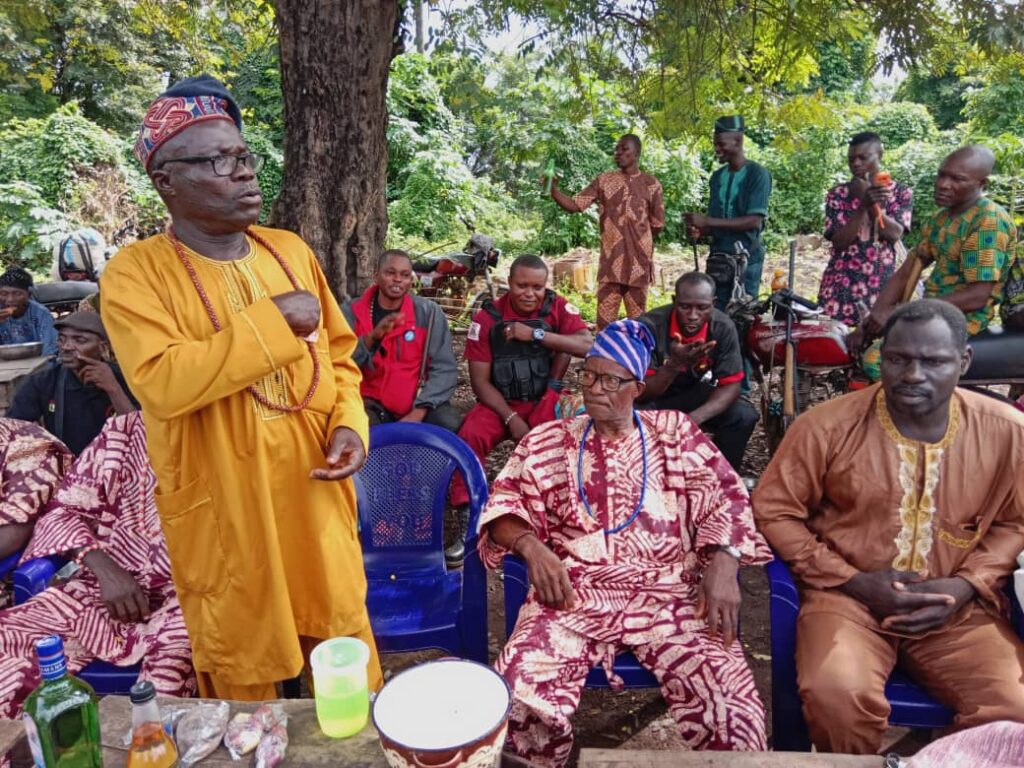Land Ownership and Traditional Autonomy in Ipapo Community.
Land ownership in Nigeria, particularly within traditional communities like Ipapo, holds unique cultural and legal implications. It is important to understand that purchasing land does not automatically confer traditional or political autonomy to landowners. This critical distinction was highlighted by the Eleyinpo Royal Family during the Towobowo Traditional Feast held on September 25, 2024, at Oriire Community, Ipapo. The royal family stressed that regardless of land transactions, HRM Oba Yekini Ademola Abioye II, the reigning Eleyinpo of Ipapo, retains traditional control and oversight over the entire community, whether the land is sold or not.
Land Ownership and Traditional Authority: Understanding the Ipapo System
In Ipapo, land transactions are closely intertwined with the community’s cultural heritage and traditional hierarchy. The Eleyinpo Royal Family, guardians of the community’s legacy, ensures that even when land is sold, it does not equate to the transfer of traditional authority. The Eleyinpo, as the custodian of Ipapo’s lands, continues to exercise governance and jurisdiction over both the people and the land, ensuring that the communal and cultural ethos of the region is maintained.
This distinction is critical, as it ensures that while outsiders may acquire land for personal or commercial purposes, the fabric of the traditional structure remains intact. The message is clear: the purchase of land is a financial transaction, not a political or traditional one.
The Role of HRM Oba Yekini Ademola Abioye II: Custodian of Tradition
HRM Oba Yekini Ademola Abioye II plays a pivotal role in safeguarding the traditions and cultural heritage of the Ipapo community. As the Eleyinpo, his responsibilities extend beyond mere ceremonial duties to ensuring the balance of power, social order, and the community’s collective well-being. Regardless of land transactions, Oba Abioye’s influence and oversight remain paramount in all traditional matters. His leadership ensures that the historical legacy and the socio-political fabric of Ipapo remain preserved, undisturbed by external economic influences.
The announcement during the Towobowo Traditional Feast underscored the Eleyinpo’s role in maintaining this balance, making it clear to all investors and land buyers that they are entering a community where tradition and modern development must coexist harmoniously.
Traditional Rights and Responsibilities of Landowners in Ipapo
Buying land in Ipapo is more than just a legal transaction; it comes with inherent responsibilities. The Eleyinpo Royal Family emphasized that landowners, particularly investors, have a civic and socio-economic obligation to contribute to the community’s development. This includes addressing critical issues such as infrastructural challenges, insecurity, health emergencies, and other unforeseen threats to the well-being of Ipapo residents.

By clarifying these responsibilities, the royal family seeks to foster a sense of collective ownership, urging investors to view themselves not just as landowners, but as contributors to Ipapo’s ongoing development. This mirrors the practices seen in developed cities, where private investors actively support the local economy and infrastructure, thus benefiting both the landowners and the wider community.
Investor Responsibilities in Ipapo: Balancing Economic and Traditional Power
Investors in Ipapo are encouraged to embrace their role as partners in the community’s development. However, with this economic influence comes the need for checks and balances. The Eleyinpo Royal Family retains the right to intervene if investors misuse their economic power, ensuring that their actions do not undermine local traditions or harm the socio-political structure of the community.
Read Also: Otunba Kajola, Chief Jaleeku Host Eleyinpo Chiefs in Council at His Residence for Customary Feast
If an investor’s actions run counter to societal norms or threaten the well-being of Ipapo, HRM Oba Yekini Ademola Abioye II has the authority to take legal action, safeguarding the interests of the community. This protective measure ensures that while economic development is welcome, it must not come at the cost of the community’s cultural integrity or social order.

Expectations for Community Development from Landowners
As part of their role within the community, landowners and investors are expected to contribute positively to Ipapo’s socio-economic development. This expectation goes beyond mere financial gain—it is about fostering long-term growth and sustainability for the entire community.
Whether through infrastructure improvements, such as better roads and public facilities, or through social programs that address health and security challenges, the involvement of landowners in these initiatives is crucial. The Eleyinpo Royal Family made it clear that these contributions are not just optional but essential for maintaining harmony between the community’s traditional values and modern economic interests.
The Intersection of Tradition and Modern Development in Ipapo
The message from the Eleyinpo Royal Family serves as a reminder that Ipapo, like many traditional communities, faces the challenge of integrating modern development with its long-standing cultural heritage. Land ownership, while crucial for economic growth, does not diminish the importance of the traditional authority that continues to govern the region.
Read Also: Chief Superintendent of Corps, Officer Bello Embarks on Familiarization Tour to Eleyinpo Palace
By fostering a collaborative relationship between landowners and traditional authorities, Ipapo can ensure that development occurs in a way that respects the past while embracing the future. The community stands as an example of how tradition and progress can coexist, benefiting from both.
Preserving Tradition While Encouraging Development
The Eleyinpo Royal Family’s recent clarification on land ownership and traditional autonomy in Ipapo highlights a critical dynamic between modern development and cultural preservation. While investors are welcome to acquire land and contribute to the community’s growth, they must do so within the framework of traditional authority. HRM Oba Yekini Ademola Abioye II remains the custodian of Ipapo’s cultural heritage, ensuring that while the community grows and develops, its traditions remain intact.
This balance is not just a protective measure but a proactive approach to community development, ensuring that all stakeholders—landowners, investors, and residents—work together towards a common goal: the long-term prosperity of Ipapo.
Read Also:Amofin Beulah Adeoye Drives Agricultural Development in Oyo State with Infrastructure Projects
FAQs
Does buying land in Ipapo grant traditional autonomy?
No, purchasing land in Ipapo does not grant traditional or political autonomy. The Eleyinpo Royal Family retains traditional control over the community.
Who holds traditional authority in Ipapo?
HRM Oba Yekini Ademola Abioye II, the Eleyinpo of Ipapo, holds traditional authority over all land, regardless of sales or transactions.
What are the responsibilities of landowners in Ipapo?
Landowners and investors in Ipapo have a civic responsibility to contribute to the community’s development, addressing issues like infrastructure and security.
Can the Eleyinpo intervene in landowner actions?
Yes, the Eleyinpo can intervene if landowners misuse their economic power or act against societal norms, ensuring the community’s well-being is preserved.
How do investors contribute to Ipapo’s development?
Investors are expected to support socio-economic initiatives, such as improving infrastructure and contributing to public health and safety efforts.
Is it possible to buy land and ignore traditional authority in Ipapo?
No, even after purchasing land, traditional authority remains with the Eleyinpo, and all landowners must respect local customs and contribute to the community.
Eleyinpo Palace Echo




Pingback: Oriire Community, Ipapo, Extends Heartfelt Gratitude to Oba Yekini Ademola Abioye II, The Eleyinpo of Ipapo Land - Ipapo Media